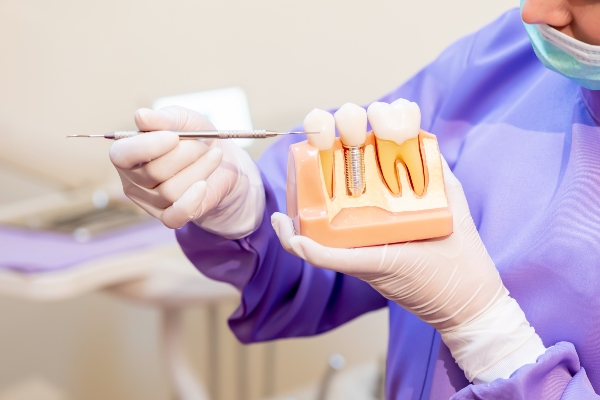Dentures: A Replacement for Missing Teeth

Over the years, dentures have become a popular replacement option for missing teeth. If you have lost your teeth whether from injury, tooth decay or gum disease, you should consider getting dentures. By matching your smile and bite, a denture can improve your appearance. Your dentist may recommend the type of denture that suits you based on different factors including the number of teeth that are going to be replaced.
Types of dentures
The two types of dentures available are complete and partial dentures. Complete dentures replace all teeth whereas partial dentures replace some teeth. Here are other differences between these types of dentures.
Complete dentures
With full dentures, an acrylic base fits over the gums. The base of the lower denture is shaped like a horseshoe, which enables it to accommodate the tongue while that of the upper denture covers the roof of the mouth. These dentures are custom-made in a laboratory from impressions taken of the mouth. Complete dentures can be either immediate or conventional. A conventional denture is made and later placed in the mouth after the remaining teeth have been removed and the tissues have healed. It is usually ready for placement several weeks after the teeth have been removed.
An immediate full denture is positioned on the same day the remaining teeth are removed. A dentist takes measurements and makes models of the jaw during a preliminary visit. A person does not have to be without teeth during the period of healing. However, the patient has to have the denture remade or relined after the jaw has healed. They should generally only be regarded as a temporary solution until conventional dentures can be made.
Partial dentures
A removable partial denture often consists of replacement teeth that are attached to a gum-colored plastic base. It is sometimes connected by a metal framework that holds the partial denture in place in the mouth. These dentures are used when natural teeth remain in the lower or upper jaw. A partial denture not only fills in the spaces created by several missing teeth, but it also prevents other teeth from changing their positions.
Sometimes crowns are placed on some natural teeth and serve as anchors for the dentures. A removable precision partial denture has internal attachments instead of clasps. These clasps attach to the adjacent crowns. This appliance is more natural-looking.
Contact your dentist
A denture is a good treatment option for missing teeth. If you are missing several teeth but not all your teeth, your dentist may recommend a removable partial denture. However, if you are missing all your natural teeth, a complete denture may be more suited for you. These dentures can improve your smile. Dentures can also improve speech problems due to missing teeth and will improve chewing. If you are thinking of getting dentures, contact your dentist to find out the type of denture that is ideal for you based on your needs.
Are you considering getting dentures in the Peabody area? Get more information at https://www.northside-dentalcare.com.
Check out what others are saying about our services on Yelp: Read our Yelp reviews.
Recent Posts
For many individuals with missing teeth, dental implants are an effective way to restore the appearance and function of their smile. However, like any medical procedure, there are potential risks and complications associated with getting dental implants. While these risks are relatively rare, it is important for patients to be aware of them before undergoing…
Adult orthodontics has become an increasingly popular solution for individuals looking to improve their oral health and the smile's appearance. Dental professionals offer a variety of treatment options to address the unique needs of adult patients. The following guide will explore the most common treatments used in adult orthodontics, highlighting their benefits and effectiveness in…
Getting dental implants as a replacement for removable dentures can be a rewarding move. These restorations are stable and lasting. You can smile, laugh, eat, and speak without worrying that they will slip out of your mouth. Here are the benefits of getting dental implants over removable dentures.Dental implants are effective in restoring teeth. Unlike…
Curious about dental implants? Read on to learn more. Dental implants have positively changed smile reconstruction, providing patients with missing teeth with an effective solution. Implants are a natural-looking and long-lasting alternative to conventional dentures and bridges. This article explains the impact of dental implants on smile reconstruction and oral health, including how they restore…


